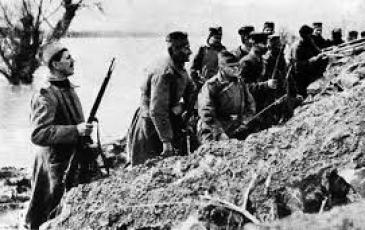1915_1021_01: The Expedition to Macedonia - FWWC 03 Serbia '14

 0 - 0 - 0
0 - 0 - 0

| Rating: | 0 (0) |
| Games Played: | 0 |
| SM: | 7 |
| Turns: | 254 |
| Type: | Stock |
| First Side: | Allied Powers |
| Second Side: | Central Powers |
Krivolak area, Macedonia, 21st October 1915:
Prior to the impending 4th invasion of Serbia, the Entente had drawn up plans to intervene and come to the assistance of Serbia. Most of these forces would be taken from the Gallipoli campaign, where it was now becoming obvious that the entire operation was doomed to failure. This promise of aid from readily available allied forces gave the Serbians hope as their enemies massed for a fourth invasion, this time on two fronts.
Near the beginning of October, the Germans were receiving intelligence that French and British forces began landing in Salonika, Greece, thereby violating Greek neutrality. The situation was confusing, and the Central Powers hoped that the Greeks could be convinced to enter the war against the allies but it was becoming clear that the longer the delay, the more powerful the allies would become. Von Mackensen therefore decided that the invasion would commence on the 6th of October, before the Bulgarians were ready to attack and before all preparations were fully completed.
As the invasion of Serbia proceeded into mid October, on the 14th the French were also forced to advance into Macedonia before the Armée d'Orient was fully formed. By the 21st, the Armée d'Orient's commander, General Sarrail, had to act quickly given the Bulgarian advances, and ordered French forces to advance up the Vardar Valley with haste, as far as they could reach, in an attempt to divert Bulgarian forces and relieve pressure on the Serbians, and ideally open a corridor for the Serbs to withdraw into Greece. Of paramount importance was the security of the strategic rail line that connected Skoplje with Salonika, the rail line which would ensure the flow of vital Entente supplies from the port.
Over the next month, a climactic battle would develop against the Bulgarians, French and British, as the allied expedition advanced further into Macedonia in a campaign they stumbled into, culminating into a confusing situation of constantly shifting goals.
[Size: medium]
*See the notes document for information on scenario design decisions and historical notes.
Prior to the impending 4th invasion of Serbia, the Entente had drawn up plans to intervene and come to the assistance of Serbia. Most of these forces would be taken from the Gallipoli campaign, where it was now becoming obvious that the entire operation was doomed to failure. This promise of aid from readily available allied forces gave the Serbians hope as their enemies massed for a fourth invasion, this time on two fronts.
Near the beginning of October, the Germans were receiving intelligence that French and British forces began landing in Salonika, Greece, thereby violating Greek neutrality. The situation was confusing, and the Central Powers hoped that the Greeks could be convinced to enter the war against the allies but it was becoming clear that the longer the delay, the more powerful the allies would become. Von Mackensen therefore decided that the invasion would commence on the 6th of October, before the Bulgarians were ready to attack and before all preparations were fully completed.
As the invasion of Serbia proceeded into mid October, on the 14th the French were also forced to advance into Macedonia before the Armée d'Orient was fully formed. By the 21st, the Armée d'Orient's commander, General Sarrail, had to act quickly given the Bulgarian advances, and ordered French forces to advance up the Vardar Valley with haste, as far as they could reach, in an attempt to divert Bulgarian forces and relieve pressure on the Serbians, and ideally open a corridor for the Serbs to withdraw into Greece. Of paramount importance was the security of the strategic rail line that connected Skoplje with Salonika, the rail line which would ensure the flow of vital Entente supplies from the port.
Over the next month, a climactic battle would develop against the Bulgarians, French and British, as the allied expedition advanced further into Macedonia in a campaign they stumbled into, culminating into a confusing situation of constantly shifting goals.
[Size: medium]
*See the notes document for information on scenario design decisions and historical notes.





















